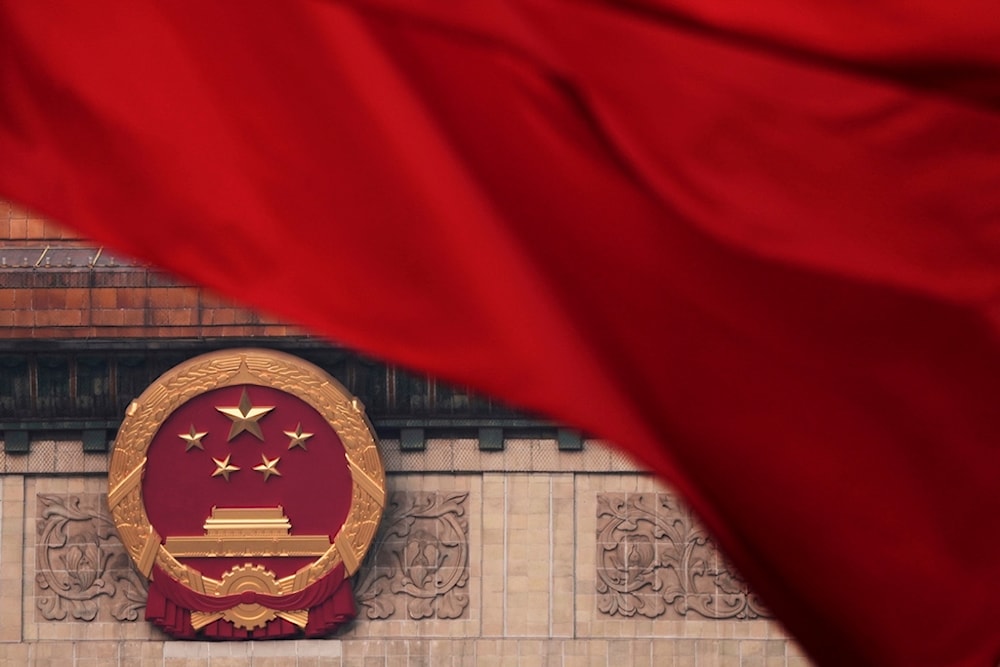China submits five-point Iran nuclear deal proposal to UN conference
China has submitted a five-point proposal to the UN Conference on Disarmament urging a diplomatic revival of the Iran nuclear deal, opposing sanctions and military action while calling for mutual respect, gradual steps, and renewed US engagement.
-

Red flags flutter in the wind near the Chinese national emblem outside the Great Hall of the People during the closing of the Chinese People's Political Consultative Conference in Beijing, Monday, March 10, 2025. (AP)
China has formally presented a new proposal to revive stalled negotiations over Iran's nuclear program, calling for diplomacy, mutual respect, and the preservation of the 2015 nuclear deal. The five-point initiative was first unveiled by Chinese Foreign Minister Wang Yi on March 14 during a trilateral meeting in Beijing with his Iranian and Russian counterparts. It was later submitted to the United Nations Conference on Disarmament in Geneva, where it was published as Document No. 2448/CD.
According to Chinese diplomats, the document outlines principles intended to defuse mounting tensions surrounding Iran's nuclear activities and offers a framework to restart talks. The Chinese delegation requested its official release as a UN document, underlining Beijing's push for a greater role in global security discussions.
The first principle calls for a diplomatic solution and warns against military escalation or punitive economic actions. "Stay committed to peaceful settlement of disputes through political and diplomatic means, and oppose the use of force and illegal sanctions," the proposal states. It urges all sides to create conditions for renewed negotiations and to avoid steps that could worsen the situation.
In its second point, the proposal emphasizes Iran's rights under the Nuclear Non-Proliferation Treaty, while also encouraging Tehran to maintain its pledge not to pursue nuclear weapons. "Stay committed to balancing rights and responsibilities, and take a holistic approach to the goals of nuclear nonproliferation and peaceful uses of nuclear energy," it reads. "Iran should continue honoring its commitment to not developing nuclear weapons, and all other parties should fully respect Iran's right to peaceful uses of nuclear energy."
The third point calls for renewed commitment to the Joint Comprehensive Plan of Action (JCPOA), the multilateral agreement signed in 2015 that placed limits on Iran's nuclear program in exchange for sanctions relief. "Stay committed to the framework of the Joint Comprehensive Plan of Action (JCPOA) as the basis for new consensus. China hopes that all parties will work toward the same direction and resume dialogue and negotiation as early as possible. The United States should demonstrate political sincerity and return to talks at an early date."
China's fourth recommendation cautions against moving the matter to the United Nations Security Council, which could trigger the reimposition of international sanctions through the so-called "snapback" mechanism. "Stay committed to promoting cooperation through dialogue, and oppose pressing for intervention by the UN Security Council (UNSC). Under the current situation, hasty intervention by the UNSC will not help build confidence or bridge differences among the relevant parties. Initiating the snapback mechanism would undo years of diplomatic efforts, and must be handled with caution."
The final principle calls for gradual, reciprocal steps to build consensus, stressing that no lasting resolution can be achieved through pressure or force. "Stay committed to a step-by-step and reciprocal approach, and seek consensus through consultation. History has proven that acting from a position of strength would not lead to the key to resolving difficult issues. Upholding the principle of mutual respect is the only viable path to finding the greatest common ground that accommodates the legitimate concerns of all parties and reaching a solution that meets the expectation of the international community."
Read more: Iran open to indirect nuclear talks if Trump ceases threats: Araghchi
Beijing framed the proposal as part of its broader strategy to promote dialogue over confrontation. Chinese officials said the country will remain in close contact with all relevant parties and will "actively promote talks for peace, and play a constructive role in realizing early resumption of talks."
Reiterating its longstanding position, China stressed that negotiations—not threats or sanctions—remain the only viable path forward. "Sanctions, pressure, and threats of force are not viable solutions," Beijing stated.

 4 Min Read
4 Min Read








